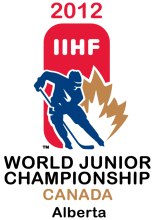EDMONTON – The first day of games is in the books at the 2012 IIHF World U20 Championship, and the four favourites clobbered their opponents by a cumulative score of 31-8. The notion of starting off strong has never been more emphatic with these scores as teams try to position themselves for the rest of the Preliminary Round leading to the playoff elimination round.
The goals totals for yesterday came close but didn’t break the all-time record. In 1982, the first four games on opening day tallied some 48 goals. Sweden beat Switzerland, 17-0; the Soviet Union beat West Germany, 12-3; Czechoslovakia edged the Americans, 6-4; and, Canada got by Finland, 5-1. Canada won gold that year.
The 2012 U20 started with a surprisingly one-sided Canadian win over the Finns followed by a more expected thrashing of Denmark by the U.S. Those Edmonton games were complemented by a 9-4 Sweden win over Latvia, surprising not for Sweden’s win or nine goals scored but for allowing four to Latvia. The final game was an entertaining 3-0 win by Russia over the Swiss, the closeness hardly surprising given the Swiss 3-2 overtime win just a year ago or the narrow 4-3 Russian win at the 2008 U20.
One more important fact can be gleaned from the opening-game success of yesterday’s four victors. Since the U20 started in 1977, only two teams have ever lost their first game and gone on to win gold. In 1999, Sweden beat Russia, 4-2, on December 26, but it was Russia that won gold at the expense of Canada in overtime of the final game. And, more famously, Canada beat Russia by an impressive 6-3 score just last year in Buffalo, but when the two countries met again for gold, the Russians turned the tables, winning 5-3.
While any of the top coaches will talk about getting better every game and improving every day, those goals are obviously not enough. A win on day one is critical to the psyche of the team, giving it a crucial boost of confidence as it heads through the Preliminary Round. Thus, the Czechs and Slovaks should feel extra motivation today – win or kiss the gold goodbye (probably).
Those two Russian wins in 1999 and 2011 also reveal another fact. Their opening day losses were to medal contenders. Whereas the top teams often play lesser teams to give them the opportunity to start slowly, Russia was thrown right into the heat of action those years. The same could be said for Finland this year. Suomi played Canada yesterday and the United States on Wednesday, the toughest opening of any of the teams in Group B. The Swiss play Russia and Sweden in their first two games as well, the toughest in Group A.
The concept of fixing a schedule to suit a team by starting with weak teams and leading to top teams began with Alan Eagleson at the 1976 Canada Cup. Host Canada that year started with Finland, United States, and Sweden, teams that finished in exactly the order the schedule suggested, that is sixth (Finland), fifth (U.S.), and fourth (Sweden). By this time Canada had found its form and was ready to play the Czechs and Soviets.
This easing into the tournament, though, is not always advantageous. Consider Canada’s schedule at the 2006 Olympics in Turin. Canada played Italy, Germany, and Switzerland to start on the road to what would be the nation’s worst Olympic result ever (seventh).
You can count on one hand the number of teams that have won U20 gold by going the entire tournament without a loss, so if history tells us anything, this year’s gold-medal team will lose a game at some point. But history also shows that that loss cannot occur in the team’s first game. Time will tell if 2012 confirms or dispels the theory.
ANDREW PODNIEKS |







